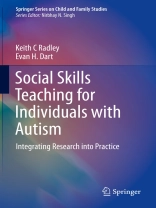This book examines current trends and practices in social skills instruction for individuals with autism spectrum disorder (ASD), focusing on empirical support of current practices and for which populations such practices have been most frequently evaluated (e.g., ages, levels of functioning). It details key practices that may be implemented as social skills teaching strategies as well as the theoretical underpinnings of the teaching strategies, relevant empirical support, and a guide to utilization supported by the empirical evaluations. These guides to utilization are a practical tool for implementation of commonly evaluated social skills teaching strategies. In addition, the book describes limitations of social skills teaching and offers recommendations for future research and intervention strategies that may overcome its current limitations.
Key topics featured include:
- Video modeling and social skills training for individuals with ASD.
- Behavioral skills training for ASD.
- Peer-mediated teaching of persons with autism.
- Social narratives of individuals with ASD.
Social Skills Teaching for Individuals with Autism is a must-have resource for researchers, professors, and graduate students as well as clinicians, therapists, and other professionals in clinical child and school psychology, behavioral therapy/rehabilitation, social work, public health, and all interrelated disciplines.
Jadual kandungan
Chapter 1. Autism Spectrum Disorder.- Chapter 2. Social Skills in Autism Spectrum Disorder.- Chapter 3. Video Modeling.- Chapter 4. Behavioral Skills Training.- Chapter 5. Social Stories.- Chapter 6. Peer-Mediated Teaching.- Chapter 7. Antecedent Strategies.- Chapter 8. Manualized Social Skills Curricula.- Chapter 9. Self-Management.- Chapter 10. Other Behavior Analytic Interventions.- Chapter 11. Didactic Instruction.- Chapter 12. Limitations and Future Research Directions.
Mengenai Pengarang
Keith C. Radley, Ph.D., BCBA-D, NCSP, is an Associate Professor in the Department of Educational Psychology at the University of Utah. He completed his doctoral training in educational psychology at the University of Utah in 2011. Dr. Radley is a licensed psychologist, board-certified behavior analyst, and nationally certified school psychologist. His research interests include social skills teaching and other supports for individuals with developmental disabilities, student behavior support in educational settings, and data collection, visualization, and analysis within single case design.
Evan H. Dart, Ph.D., is an associate professor in the Department of Educational and Psychological Studies at the University of South Florida. He graduated from the school psychology doctoral program at Louisiana State University in 2013. Dr. Dart is a licensed psychologist and a board-certified behavior analyst whose research interests include school-based interventions for students at-risk for behavioral disorders, behavior assessment methods, and the use of progress monitoring data to make decisions about student performance












